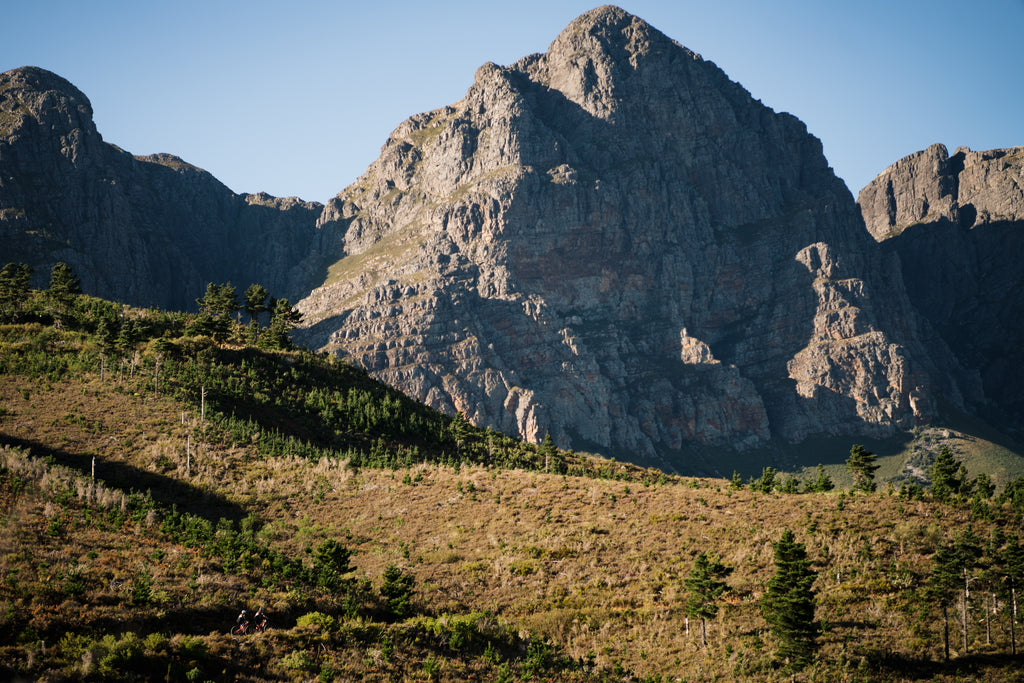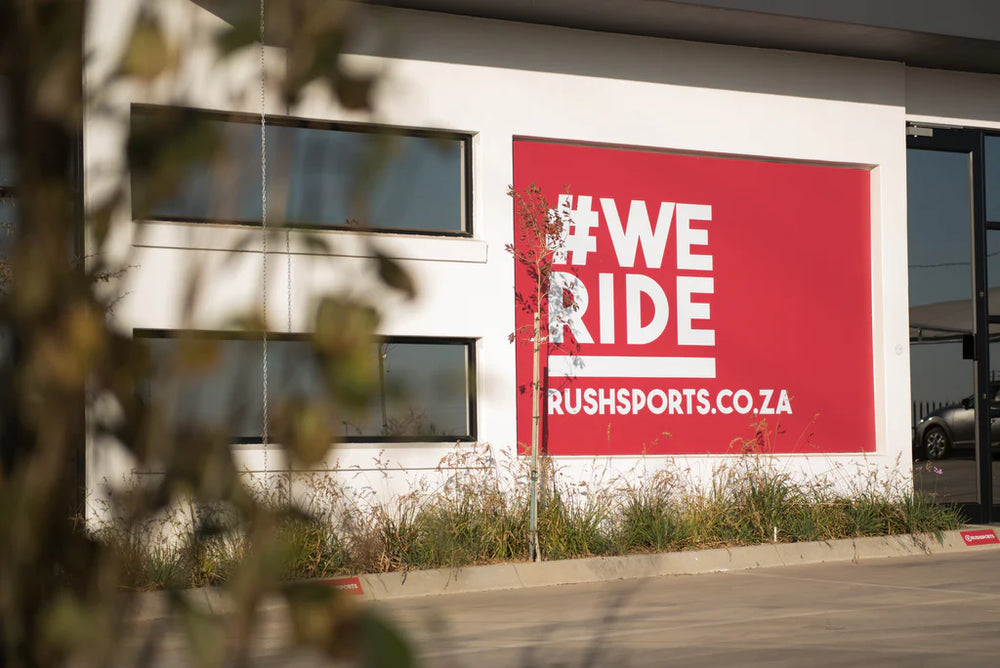
Two-time Olympian Erica Green and exercise scientist Louise Jansen van Rensburg have spent the past 17 years working together at Daisy Way Coaching Systems (DCS) honing the skills and fitness levels of hundreds of South African mountain bikers. From professionals to newbies, the DCS team covers it all.
Recently Oli Munnik visited DCS's HQ in Somerset West to find out what makes this dynamic duo tick. And of course, a visit wouldn't be complete without a ride ... Erica and Louise led Oli on a tour of Lourensford’s thrilling Uitkyk Trail.
 ERICA and LOUISE
ERICA and LOUISE
Erica approached Louise, then the lab's sport physiologist, with the proposition of joining DCS. Seventeen years later and the pair have developed an incredible business relationship that continues to flourish.

Riding for 31 years
IG: @daisyglug
- Hometown: Someset West
- Day Job: UCI Level 3 Cycling Coach
- Bike: Santa Cruz Blur TR
- Tyres: Maxxis Rekon Race 29x2.4” WT
- Favourite Riding Spot: Lourensford MTB Trails
- Olympic Games: Two: 1996 & 2000

IG: @daisywaycoaching
- Hometown: Paarl
- Day Job: Online Cycling Coach
- Bike: Santa Cruz Blur XC
- Tyres: Maxxis Aspen 29x2.4” WT
- Favourite Riding Spot: Plasir MTB Trails
- Cape Epics: Two: 2013 and 2015



The aspect that always comes to mind is the incredible design evolution of mountain bikes, especially since I started cycling in the 90s. This then shifts into the availability and reliability of modern equipment ... things just don't break like they used to!
Then of course there is the scope of where we can ride – the sheer number of safe trail parks combined with the quality of trails is beyond our wildest dreams. We've found that these riding spots have led to a dramatic increase in youngsters and women riding who are eager to improve their skills.One thing that hasn’t changed over the past 31 years is the thrill of riding my bike … as the saying goes “loving what I do” means it feels as if I haven’t work a day in my life.

2. Louise, you joined DCS in 2005. What sparked your love for mountain biking and was it a big leap of faith to make coaching your profession?
I grew up with cycling. One of my brothers was a roadie, and the eldest was an old school downhiller in the late 1980s. Back then the term (amateur) stage racing or mountain bike fun ride didn’t exist. After graduating, my work focussed mainly on cycling and I also became one of the first researchers to publish a scientific paper on the performance aspects of mountain biking. And even though I didn’t yet ride myself back then, having worked with some top riders, I immediately realised these were ‘lekker’ people!
Becoming a coach was a natural transition from my field of study and I could really explore my fascination with enhancing performance, by training better and smarter. All that was still missing, was that I needed to learn to ride myself…and I was lucky enough to get shown the ropes by an Olympian!

3. Erica, are the majority of your DCS clients training for an event, or up-skilling for life? What’s the trend?
All our athletes are aiming for SOMETHING – a goal. Whether it’s general fitness for finishing a bike tour, or lining up at a National Championship, this is what we’re all about – each individual and their personal goals.
Over the past 5 years we have increasingly come to realise that conditioning is the easy part – it’s making our athletes smoother and faster on technical sections where most of the time is made up.



4. What is the most common mistake amateurs make in their approach to mountain biking?
Erica – Starting out too fast and too hard – especially for women, who usually enter the sport through a boyfriend or husband. This tends to burn them out, and they rely on endurance tenacity instead of starting out slower, and focussing on mtb skills If you are confident in your foundational skills, the trails are safe and fun. #skillsfirst
Louise – Not knowing their own ability. First learn to walk before you run. And there is no shame in starting out on flats. Try first to master all basic skills (wheel lifts, bunny hop, etc), before investing in cleats…this is even more pertinent to youngsters starting out.
5. Where do you think an average recreational mountain biker can make the biggest improvement to their riding?
Erica – With a focus on their MTB handling skills – we see our clients' level on enjoyment go up exponentially as soon as they feel balanced and confident on their mountain bike!
Louise – Consistency is key. But keep it simple. Just ride. You have to put yourself out on the trails, practice and sharpen up your skills continuously.

Erica – After riding a more twitchy “cross country” style mountain bike, most of my riding now is aimed at simply enjoying the feeling: both uphill and downhill. For this you need a perfectly BALANCED mountain bike – one that suits your style of riding.
In the Santa Cruz Blur TR I opted for slightly longer travel suspension, while still enjoying the light weight of the carbon frame – best of both worlds.
Most notably is the switch to the bigger volume Maxxis Rekon Race 2.4 tyres – I can ride them at a slightly lower pressure – makes those fast and tight descent corners an absolute thrill!
Getting my front and rear suspension completely dialled in, no matter if I’m climbing or descending, my bike feels like it “carries me”. Absolutely loving the 120mm front and 115 mm rear suspension!

Louise – Nothing beats riding a sturdy bike with the perfect wheelbase and geometry for both climbing, downhilling and getting around those extra tight switchbacks. My riding style is probably not as aggressive and daring as some around me, so the lighter 100mm front and rear suspension is more than enough for me! The broader tyres give me that extra confidence boost to keep up with ‘the boys’ and of course also a few fearless women around me on the downhills!

7. Louise, you’ve conquered the Cape Epic in 2013 and 2015, why do you think this particular race has captured South Africa the way it has. Any inklings of lining up again on your Blur?
My goodness! As they say: never say never, right?! The Absa Cape Epic is a truly remarkable event, everything is planned to perfection and all aspects of the full racing experience is thought of. It is set in the most pristine locations and the immaculate trail network it utilises just keeps on expanding. They have come up with the perfect recipe and inspire everyone to get involved in the sport! It is only when you participate in global events, that you realise that the Absa Cape Epic is not the bench mark for mountain bike events in South Africa – they are the bench mark for events in the world. And I have yet to find a race on their level.

8. Erica, you run your coaching and skills sessions from the magnificent Lourensford Trail Centre … what attracted you to it?
We were offered the opportunity to have a “custom built mountain bike skills park” on a small piece of the magnificent Lourensford property. Initially I thought: jumps, berms etc. The piece of land is flat, so this made it tricky to perfect these elements. Then I thought about all the thousands of skill sessions we’ve conducted and pieced together all the elements that can teach mountain bikers the fundamental mtb skills, and went about including each of these into the design of the park.
For instance, switch-backs seem to be many mountain bikers' nemesis, so we built a high mound and built some uphill and downhill switchbacks where riders can repeatedly practice just this element.
For our young high performance athletes, I looked at where the weaknesses are: wet muddy roots, step ups etc. and built these in too!


They can get in touch with us at:
- info@daisyway.co.za
- Erica – 082 22 00 00 2 (based in Somerset West)
- Louise – 079 516 7300 (based in Val de Vie, Paarl)
- We also have social media pages:
- Instagram: @daisywaycoaching
- Facebook: Daisyway Coaching Systems
We have also expanded our coaching team and the aim is to help young coaches develop and share their knowledge, especially where it comes to youth – skills and laughter first, the rest comes naturally!

SA MTB'S QUEEN'S ROCKET-SHIP
Santa Cruz Blur C S TR

With a career in the bicycle industry spanning 30 years, Erica and her husband Spook Groenewald - himself an industry stalwart - have amassed a treasure trove of memorabilia from their life on two wheels. From a dizzying array of number boards and peak caps to past frame-sets enjoying their hard earned retirement hanging on the wall, the DCS HQ is something to behold.
With Erica's Santa Cruz Blur TR joining the family a few weeks ago, she explains to Oli how the dual suspension's versatility and balanced ride is like nothing she's ridden before. Given Erica's pedigree and perspective, that is saying a lot!
The trails surrounding her Somerset West home are anything but flat, so Oli was surprised to see a 34T front chain bolted onto the drive-side crank ... "Ag, you know Oli, sometimes I just can't shrug the old school in me", promptly followed by another trademark smile from SA's MTB trail blazer.
Fox Performance front and rear suspension are complemented by a set of high volume Maxxis Rekon race 29x24" WT tyres and a pair of Death Grip grips!
Erica's excitement tells you everything you need to know about her experience on the Blur TR.

















